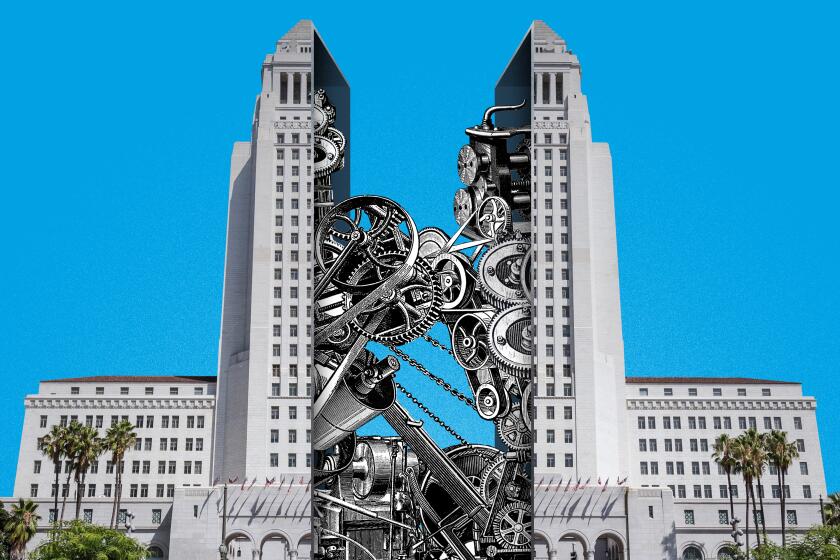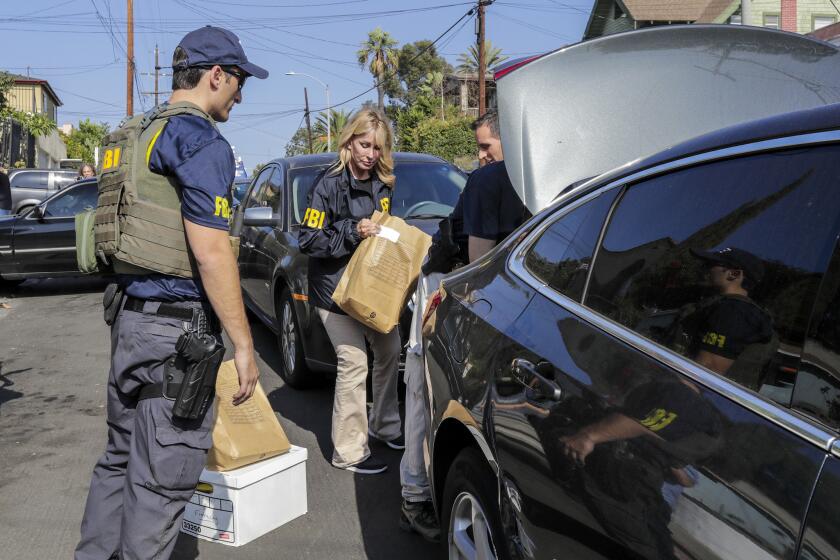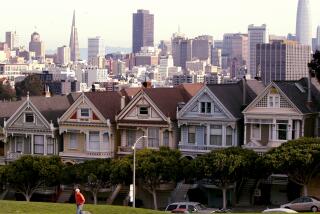Editorial: Los Angeles must take politics out of development decisions

In the federal criminal complaint filed in 2020 against then-City Councilmember Jose Huizar for allegedly shaking down real estate developers for $1.5 million in cash, lavish gifts and campaign contributions, an FBI agent laid out how Los Angeles’ convoluted and highly political approval process enabled Huizar’s scheme.
“Large-scale development projects require a series of applications and approvals prior to, during, and after construction,” Special Agent Andrew Civetti wrote. Those approvals run through multiple departments and commissions, and each approval process requires actions by public officials.
“City officials can benefit a project or take adverse action against a project by advocating for, pressuring, or seeking to influence other City officials, departments, business owners, and stakeholders,” Civetti explained.
In other words, almost every step of the process is subject to direct or indirect influence by the city’s elected officials. The 15 council members, in particular, wield enormous power. Council districts are like fiefdoms, over which council members have sole discretion to make real estate decisions, such as whether a project gets an exemption from height limits or zoning, or whether it should be granted a tax break. These decisions can make or break a project.
Los Angeles City Hall has been rocked by scandal after scandal, but now there’s momentum to reform city government.
The power to determine what gets built within a district has become toxic — and not just in the sleazy illegal way outlined in the Huizar indictment. (Huizar has pleaded not guilty and is scheduled for trial in February.) City Hall’s dysfunctional relationship with development has exacerbated many of L.A.’s ills: Distrust of government. Unaffordable housing and homelessness. Segregation and inequality. Traffic and smog.
In a leaked audio recording that led to the most recent City Hall scandal, then-Council President Nury Martinez and current council members Gil Cedillo and Kevin de León strategize how to redraw council districts maps to benefit themselves and their allies, at the expense of other council members. It was the racist and dismissive nature of their comments that got the trio in trouble, but the discussion also highlighted the political value of having real estate “assets” like stadiums, airports and public property in their districts.
Why? Because when property owners seek city permission to build or grow, the council member can exchange approval for public benefits, such as funding for a new park, or to benefit themselves in the form of campaign contributions. It’s a tremendous power that can be used for the good of a district — or to its detriment.
If Angelenos want to reduce the risk of corruption, improve public trust in government and make it easier to create housing, jobs and livable communities, the city has to fundamentally change how development decisions are made. This means creating clear and modern land-use rules for every neighborhood in the city and removing council members’ exclusive discretion over approvals.
The Housing Element is the perfect opportunity to make Los Angeles’ housing and land-use policies match its leaders’ progressive rhetoric.
Over decades, L.A.’s political leaders have allowed the city’s often suburban-style zoning and land-use rules to become outdated and unwieldy. Because of that, proposed developments often need exceptions, each of which is a potential political negotiation. That makes it slower, less certain and more expensive to build in L.A. And for years, council members have used their power to bend to neighborhood concerns, reducing the amount of housing built or killing projects altogether.
The effects of years of this destructive case-by-case method of building approval are clear today with a deep housing shortage, segregation and uneven development quality and investments from neighborhood to neighborhood.
In 2020, after Huizar was indicted, three former high-ranking city officials called for a planning reform commission. The idea was to appoint a panel of urban planning experts, and civic, neighborhood, business and labor leaders to come up with a modern process that eliminates political control of project approvals. It’s a good idea. Elected leaders are rarely willing to make transformative change on their own; a commission could be the push they need.
The recent L.A. City Council scandals show, again, the need for reform to prevent developers from undue political influence. Here’s how a commission could help do that.
This scale of reform is possible, as other U.S. cities have shown. More than a decade ago, Miami replaced its complex and ambiguous development regulations with a simpler system designed to encourage denser, more walkable development that fit the scale of the community. Projects that comply with the strict rules can be approved administratively. Projects that deviate from the rules go through a lengthy public and political approval process. The regulations have helped transform moribund districts into bustling residential and commercial centers.
San Diego leaders in 2020 approved regulations that allow residential buildings near transit to be built with greater density and height if the developers agree to include more affordable units than required. Projects that fit the criteria can get permits from city staff, bypassing the planning commission and City Council.
The idea was to get the public and political participation at the front end in the development of citywide land-use regulations and then let professional staff handle individual projects, former San Diego Mayor Kevin Faulconer said. “Have the debate once and don’t keep fighting over and over. That gives you more consistency. Without clear rules of the road and consistency we’re not going to build the units that Southern California needs.”
Los Angeles has made progress, but it didn’t come from city leaders. In 2016, voters approved the Measure JJJ initiative that created the Transit Oriented Communities program to allow taller, denser buildings near rail stations and major bus stops if the projects include affordable housing. Generally, if developers follow the guidelines, they can bypass the planning commission and City Council to get building approval in an average of six days. Otherwise approval takes about eight months, according to the Planning Department. Since 2017, the TOC program has added 37,000 units of housing to the development pipeline, including 8,000 units of affordable housing.
But that’s just one program. There is support for systemic change in City Hall. We surveyed elected city officials and candidates, and 72% of respondents, including Mayor-elect Karen Bass, said they support changes that remove City Council members’ discretionary power over land-use decisions. Most said they want to limit that power as part of a broader effort to modernize land-use plans and development processes.
But a few noted that council members are directly accountable to their voters and they don’t want to leave major community decisions up to unelected staff and appointees.
“Without the oversight, inferior projects could come to our communities without adequate representation for the community that may be adversely impacted,” wrote Councilmember Heather Hutt.
That’s a legitimate concern. Reforming L.A.’s broken development approval process will be a balancing act. The city has to work with communities to create a comprehensive vision for growth, develop regulations to easily carry out that vision and be nimble enough to adjust the policies to address community concerns as they arise.
Los Angeles needs to build hundreds of thousands of additional homes to bring down housing costs and create neighborhoods that are more walkable, healthier, safer and better able to withstand the effects of climate change. That’s not going to happen until we fix the city’s dysfunctional, unjust land-use and development system.
More to Read
A cure for the common opinion
Get thought-provoking perspectives with our weekly newsletter.
You may occasionally receive promotional content from the Los Angeles Times.













